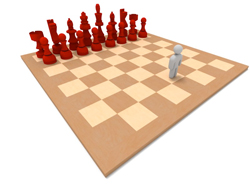Following on from Jane Basnett’s recent article on NQTs, a pastoral professional-turned newly-qualified teacher (and former colleague of Basnett’s) gives her advice to veteran teachers dealing with newcomers.

I'm about to embark on my NQT year teaching English in an 11-18 academy in the South West. Before doing the PGCE, I worked in other areas of education for four years, first in university outreach, then in a pastoral and academic role in an independent school, where I was a colleague of Jane Basnett. Following on from Jane's very welcome and gratefully received ideas in an earlier post - 'Be prepared: A veteran's advice for NQTs' - here's a view from The Other Side: an NQT's guide to handling NQTs...
Recently, I was reminded of Baz Luhrmann's chart-topping single from 1998 called ‘Wear Sunscreen’. The song itself was based on an article written by Chicago Tribune Pulitzer Prize winning journalist Mary Schmich. Schmich wrote that "inside every adult lurks a graduation speaker". It got me thinking about what advice I would give to NQTs and others about to embark on a career in teaching... So, here goes.

Remember that moment when you get home from work or back from a night class and your partner’s in a bad mood? How long does it usually take you to work it out? Hours? Minutes? A few seconds?
Most of the people I ask say a few seconds, some even go as far to say that they can tell before they’ve even stepped foot in the room. However long it takes you, students are no different, they’ll make up their mind whether the lesson will be enjoyable or not within the first five minutes. This can mean the difference between an engaged learner and a disruptive one, and once an opinion has been formed it can take a lot for that to be changed.

Teaching strategies refer to methods used to help students learn the desired course contents and be able to develop achievable goals in the future. Teaching strategies identify the different available learning methods to enable them to develop the right strategy to deal with the target group identified. Assessment of the learning capabilities of students provides a key pillar in development of a successful teaching strategy.
After analysing the target learners, teachers can choose from the following teaching strategies to ensure maximum output is achieved with their class:

Over the last few weeks, lots of bloggers have been giving advice to incoming NQTs about how to deal with behaviour in their first year of teaching. Whilst not wanting to compete with this advice, as the advice comes from more experienced teachers, I would like to give my own personal tips to NQTs, as it is only a year since I was in that position myself.
There are a number of things which I wish I'd known last year, which would have made my first year a whole lot easier.

I wanted to create a simple list of what I view in my humble opinion as the best books for teachers out there in the market. I thought of two key factors: ‘philosophy’ and ‘practicality’. By ‘philosophy’ I mean those books that get us thinking deeply about our role and our pedagogy – books that reinvigorate our passions and spark new thinking. ‘Practicality’ is self-explanatory but essential for the best educational books for teachers. If a book gets you scribbling notes furiously or splashing each page with post-it notes then its usefulness is clear. The selection is in order numerically, but that doesn’t indicate any order of priority of quality:

During my visit to the Association for Physical Education's national conference, I was inspired by Keynote speakers Iwan Thomas and Richard McCann talking about how 'attitude is everything', and that it's all about saying 'I can'. Both of these speakers were absolutely right, but it got me thinking about one essential ingredient that all of our kids need before they can be confident enough to say 'I can': poker chips.
It took me back to the first ever teacher training video that I ever watched as a GTP student, learning my trade in a school in special measures just over 10 years ago. I vividly remember sitting down to watch this video with the rest of the teaching staff and being sceptical about what I was about to see. However, after just a few minutes I was hooked and have always remembered the powerful message that was conveyed by Rick Lavoie. His message was simple: our kids need to be given self esteem by us as teachers and parents if we want them to join in the game of life. We need to give them poker chips every day so they feel confident enough to play alongside the popular kids at school, enough poker chips so they can answer questions in class, and enough poker chips so they can take on the challenges that life throws at us.

A community-driven platform for showcasing the latest innovations and voices in schools
Pioneer House
North Road
Ellesmere Port
CH65 1AD
United Kingdom